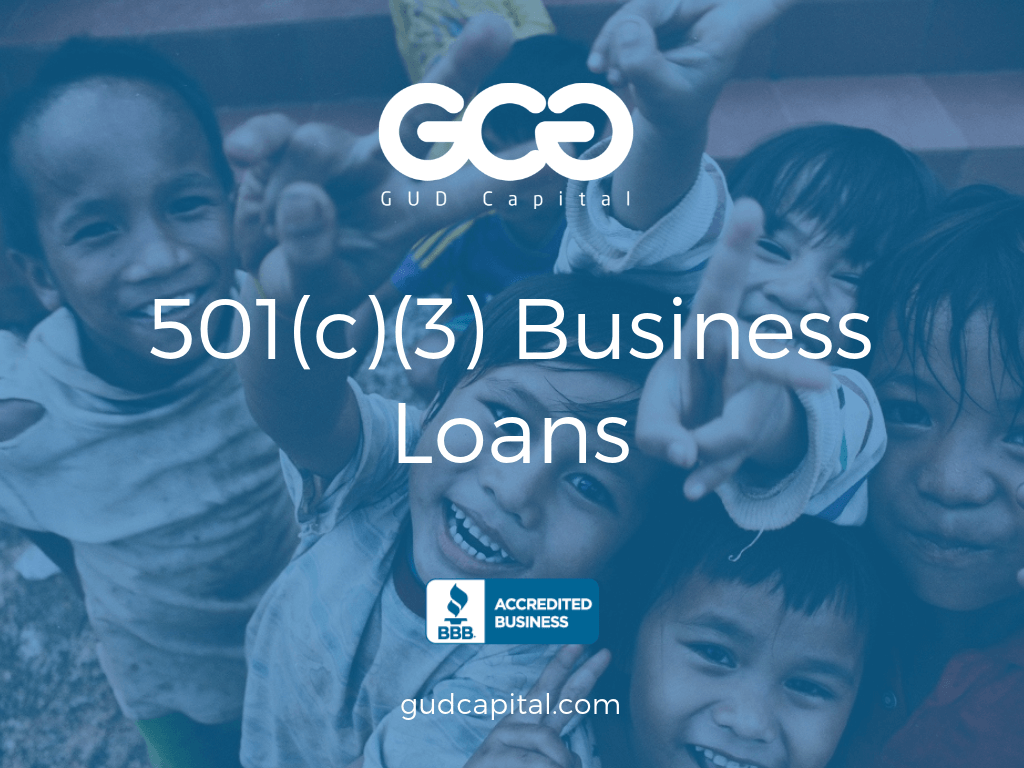501(c)(3) Working Capital Loans
501c3 is the portion of the US Internal Revenue Code that allows for federal tax exemption of nonprofit organizations. These include those that are considered public charities, private foundations or private operating foundations, religious, educational, literary, or testing for public safety for example. The US Department of Treasury regulates and administered the 501c3 non-profit. There are limitations to organizations under the 501c3 non-profits though, such as conducting political campaign activities to intervene in elections office or lobbying. These organizations risk the loss of tax-exempt status if any of these rules are violated. Moreover, to be considered a 501c3 non-profit, an organization must obtain at least 1/3 of its donated revenue from a relatively broad base of public support. 501c3 non-profits are also highly regulated, and no part of the activities or the net earnings can unfairly benefit any officer, director, or any private individual even if the organization shuts down. Furthermore, trends are developing how organizations operate as a non-profit and as for the 501c3 non-profits, patterns can offer them a window into what large segments of the population like, what they don’t, and how they like to be engaged. Thus, these trends can help us to see what is influencing future trends in non-profits to see which are making an impact and which are not.
Quick-jump to the following sections:
- 501(c)(3) Bank Lending
- 501(c)(3) Line of Credit
- 501(c)(3) Accounts Receivable Financing
- 501(c)(3) Alternative Business Loans
- S501(c)(3) Cash Advance
Therefore, one of the most significant trends within 501c3 non-profits is the increase in showcasing their impact. There is a focus on social impact transparency; many involved in these organizations believe that they exist to solve problems and its important to showcase their influence. The ability to measure and articulate impression is critical for non-profits that wish to build meaningful relationships with their supporters. Hence, many sectors are pioneering new ways of conveying the influence of their programs in a real and tangible way. There is also an increase in marketing getting more personal with their audience and supporters. The world of marketing as a whole is beginning to focus more on delivering personalized content. Non-profits are examining their process to best get their message across, such as choosing the right time, and across the right medium to engage customers and prospects. It no longer is enough to send personalized marketing materials; now non-profits must go a step further. The new approach is making marketers of 501cs non-profits consider and understand their supporters even more by asking questions like who are they? How do they want to be engaged or how they can make a difference?
Technology is becoming more relevant for non-profit too. Instead of planning things on their own, non-profits including 501c3’s are taking advantage of tools like Facebook Ads and Google Ads to promote their events to reach their targeted audiences. Then, use them to calculate their return on said events by using analytics platforms. Additionally, embracing technology and social media makes it easier for one organization to run multiple events a year. Software engineering is being looked at more closely too by non-profits to increase their efficiency. Opting for speed, they are employing web developers to help out with international fundraising markets that are popping up across the globe. Before JavaScript frameworks were what sped up developer time, however without careful attention to detail it also led to slowed browser rendering, made SEO trickier, and could potentially harm accessibility. These problems get magnified when doing business with international markets, where larger percentages of the population work with older hardware, slower connections, and limited data plans. So as more of the world connects to the web and non-profits expand beyond the U.S., investing in faster web development is a smart way to go.
Although, with all the advancements happening for non-profits and 501c3’s, some struggles facing charitable non-profits. There are still limited resources, increased demands on nonprofits, stemming from increased needs in communities, and the growing awareness that every non-profit need to be an active vocal advocate for their non-profits mission to affect policies in the community. Therefore, it is essential to keep up to date on budget cuts, cybersecurity, changes in charitable giving, peer-to-peer fundraising and crowdfunding. Also, wellness for non-profits since being sustainable is more important than the money. Lastly, providing moral leadership for the values of diversity, inclusion, and equity are all vital to keeping in mind when running or working in 501c3 non-profits.

Types of 501(c)(3) Working Capital
Business loans for non-profits are generally used for working capital as there are limited options for 501(c)3s. While many for profit business loans are used for acquisitions, commercial real estate purchases, debt consolidation and refinancing, nonprofit business loans are more limited due to the structure of the company, and lack of personal guarantee. Common working capital uses include:
- Making payroll
- Hiring employee
- Paying vendors
- Rent/lease payments
- Unexpected bills
- Emergency funds
Because of the trickiness involved with financing nonprofits, below we will taking a look at the limited options available for 501(c)3s non-profit businesses:
501(C)(3) Bank Lending
Bank loans for nonprofits are the most common, and most affordable financing facility for 501c3s. Bank term loans for nonprofits are mostly used for working capital, but can be used for virtually any use including purchasing real estate and facilities, capital improvements, long-term investments and refinancing and consolidation of business debt.
| Rates | 5-15% |
|---|---|
| Terms | 1-30 years |
| Funding Amounts | $50,000-$5,000,000 |
| Collateral | Required |
| Fees | Medium costs |
Bank Line of Credit
A line of credit is a type of pre-approved financing used by nonprofits for both working capital and emergency uses. A line of credit allows a nonprofit to access pre-approved funds whenever they need them without having to seek further approval from the lender. Another great feature about a line of credit is that you only pay interest in the money you draw — not the overall facility amount.
| Rates | 5-15% |
|---|---|
| Terms | 1-2 years |
| Funding Amounts | $10,000-$5,000,000 |
| Collateral | A/R Required |
| Fees | Medium costs |
501 (c)(3) Accounts Receivable Financing
Non-profit accounts receivable financing is financing that leverages a 501 (c)(3)’s accounts receivable to acquire financing. Accounts receivable financing can come in two forms: A/R financing and factoring. A/R financing uses accounts receivable as collateral for a line of credit, whereas factoring involves selling unpaid invoices to obtain upfront financing.
| Rates | 0.5-2.5% |
|---|---|
| Terms | 1-3 years |
| Funding Amounts | $250,000-$10,000,000 |
| Collateral | Required |
| Fees | Medium costs |
501 (c)(3) Alternative Loans
Not every nonprofit will qualify for a conventional business loan from a bank. For those 501c3s with good revenue and cash flow, and option could be a midprime alternative loan. Alternative loans offer nonprofits with affordable financing rates and decent terms, without the strict requirements that bank underwriting requires. Since midprime alternative loans are shorter in term, the uses are almost always for working capital.
| Rates | 10-25% |
|---|---|
| Terms | 1-10 years |
| Funding Amounts | $10,000-$5,000,000 |
| Collateral | Not Required |
| Fees | Medium costs |
501(C)(3) Cash Advance
Nonprofit cash advances are a fast-funding business financing product that requires few documents and can be approved with fluctuating revenue. A nonprofit cash advance isn’t a loan, but instead the sale of the nonprofits future receivables to a nonprofit funding company in return for access to immediate cash. The approval and funding process takes as little as a few hours with minimal documentation.
| Factor rates | 1.10 – 1.50 |
|---|---|
| Terms | 3-24 months |
| Funding Amounts | $5,000-$2,000,000 |
| Collateral | Not required |
| Fees | Low to High costs |
Summary
Loan and working capital options for 501c3 non-profits are available. The key is financing the right funding option for your non-profits individual circumstances and needs. While options are available, they aren’t necessarily plentiful. If you have a non-profit 501 c3 company and looking for financing, please reach-out to one of our financing specialists, and we’ll help you navigate the process.
[wp-review id=”100321″]





















